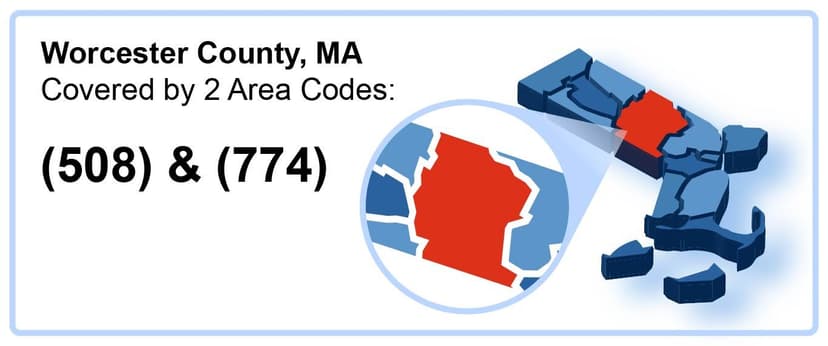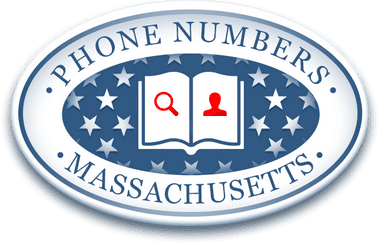What are Worcester County Area Codes?

Area codes are sets of three digits that start 10-digit telephone numbers. Introduced by the North American Numbering Plan (NANP), they designate distinct geographical areas known as Numbering Plan Areas (NPAs) within the country. The Massachusetts Departments of Public Utilities supervises the introduction and management of Massachusetts area codes.
Two area codes presently serve all of Worcester County and parts of surrounding Massachusetts counties.
Area code 508
Created in a split from the 617 NPA, area code 508 is a Massachusetts telephone area code in the NANP. It covers the entire Worcester County including cities like the City of Worcester, Fitchburg, Gardner, Leominster, and Southbridge. It was introduced for service in July 1988.
Area code 774
Activated for service in May 2001, area code 774 is the NANP telephone area code that overlays the 508 numbering plan area. It serves the same communities as area code 508.
What are the Best Cell Phone Plans in Worcester County?
Data released from a 2018 CDC survey indicate that more county residents are switching from landline phones to cell phones. In Massachusetts, approximately 40% of adults used only cell phones. This figure contrasted with 6.5% of the adult population who chose landlines as their only means of telecommunication. Among children (below 18 years), 43.7% relied exclusively on cell phones while only 4% solely used landline phones.
Like cell phones, VoIP (Voice over Internet Protocol) phone services have continued to attract more subscribers within Worcester County. VoIP provides a wide range of telephony services offerings at lower rates than traditional alternatives.
Worcester County, along with the rest of Massachusetts, generally enjoys remarkable network service from the four primary carriers. However, in the deep valleys and remote rural locations, carriers have significantly lower coverage and weaker network strengths than in the urban and suburban centers.
Of the major phone carriers, AT&T has 99.9% coverage of the county while Sprint provides approximately 86% coverage. Verizon’s service is also impressive, providing roughly 97% coverage, while the T-Mobile network covers 94.2% of the county.
What are Worcester County Phone Scams?
Phone scams use telephone services to deceptively obtain residents’ financial information and steal their money. Residents can employ phone number search tools to help retrieve details of scammers’ identities. The Worcester Consumer Rights Program (WCRP) and the Massachusetts Attorney General’s Office (AGO) are public agencies committed to protecting residents from phone scams. Victims of phone scams can file complaints with the AGO or report to the FTC.
The following scams are commonplace in Worcester County:
What are Lottery Scams?
Lottery scams try to capitalize on the marks’ greed by offering high returns for little effort. The callers tell their targets that they won lotteries and then ask them to pay processing fees or taxes to receive the prizes. The victims are asked to wire the payments because the lotteries were won in foreign countries. Residents can guard against these scams by remembering that it is illegal to participate in foreign lotteries. The AGO also advises residents to contact the Massachusetts State Lottery to ascertain the legitimacy of lottery companies that contact them. Report lottery scams to the FTC, OCABR, local law enforcement agencies, or Massachusetts AGO.
What are Utility Scams?
The National Grid is an electricity and gas company that serves over 7 million consumers in Massachusetts and other northeastern states. Scammers pose as employees of this utility provider to trick consumers into parting with their money. Citing overdue balances on these customers’ accounts, they demand immediate payment through prepaid cards, wire transfers, and Green Dot gift cards. They will threaten their victims with immediate service disconnection if they fail to comply quickly.
In a variant of this scam, the callers tell the customers to make payment for the replacement of “faulty” meters. They frighten these unsuspecting customers into believing that they are about to lose their power supply because of these “useless” meters.
Although National Grid often calls their customers to offer payment options for overdue bills, they never demand direct payment over the phone. Customers are also reminded that electric meters are the properties of the National Grid and that they will never bear replacement costs. Consumers contacted by phony National Grid employees or those who wish to verify suspicious callers’ identities should contact National Grid at 1 (800) 322-3223. In some instances, caller identity verifications can also be done using phone number lookup services.
What are Impersonation Scams?
The Worcester County Sheriff (WCSO) has alerted residents of scammers pretending to be deputies in the Sheriff’s Office. These scammers inform their marks about arrest warrants against them and demand that they pay fines to avoid jail. They tell their victims to pay for fines with prepaid debit cards and give out the card numbers on the phone. Alternatively, they may ask for the targets’ credit card information. Often using the Sheriff’s name or number, these fake law enforcement employees usually refuse to provide specific details about these warrants.
Residents can utilize reverse phone lookup services to determine if such calls are legitimately from the Sheriff’s Office. The Worcester County Sheriff’s Office reminds residents that its officers will never call to demand payment for fines. Regardless of these scammers’ aggressive and intimidatory tactics, residents are warned never to provide their financial information over phone calls they did not initiate. Targeted residents should contact the WCSO to verify suspicious callers’ claims.
What are Charity Scams?
Scammers impersonate representatives of legitimate charities to exploit the generosity and kindness of Worcester county residents. These scams are particularly rampant in the wake of natural disasters, terrorist attacks, and other tragedies. Scammers often use names that resemble those of reputable organizations to convince locals of their credibility. However, a resident can confirm the caller’s claims by using a reverse phone number lookup service to run a check on their phone number. Aggressive solicitation techniques are usually employed by scammers to pressure their targets to donate.
Residents are cautioned to properly research charities they wish to patronize. All legitimate charities soliciting within Worcester County must register on the Massachusetts AGO’s Non-Profit Organizations and Public Charities list. Residents can complain online to the Massachusetts AGO if they believe their donations were fraudulently solicited.
What are Robocalls and Spam Calls?
Robocalls are placed by autodialers to deliver recorded messages to many phone users. They were introduced for telemarketers, politicians, organizations making public service announcements, and debt collection services. They offer cost-effective options for circulating large volumes of calls. This feature and the ease of spoofing robocall numbers make them useful to scammers. Residents can use phone number lookup tools to identify persons behind scam robocalls targeting their financial information and money. However, this is not always possible because of the anonymity conferred by spoofed robocalls.
Residents can cut down on robocall frequency with the following recommendations:
- Get off the phone once you hear a recorded message. Robocalls may attempt to trick you by using a real human voice, but they will fail to respond to your queries or comments. Also, do not follow any suggestion to chat with a live operator by pressing a key.
- Search online for a public website that offers free reverse phone lookups capable of revealing the numbers used for robocalls.
- Call the FTC at 1 (888) 382-1222 to report the illegal robocall or submit a report online.
- Sign up for free on both the FTC’s National Do Not Call Registry and the Massachusetts’ Do Not Call List. These registries block robocalls from telemarketers within the U.S. Unfortunately, joining these registries does not stop all automated calls. Foreign robocalls will still be able to target you, although they will be easier to detect. The FTC’s website also offers procedures for blocking unwanted calls to consumers.
- Find out the ways of blocking phone numbers from your phone company. Choose free blocking options to avoid incurring costs associated with blocking the multiple spoofed numbers that scammers often use.
How To Spot and Report Worcester Phone Scams?
Phone scams can be very hard to identify especially by the uninformed and naive who are ignorant of the tell-tale signs. Besides, scammers make it more challenging by regularly formulating new tricks to steal their victims’ sensitive information and funds. It is, therefore, imperative that residents prepare themselves by learning about phone scams and staying vigilant. Many reverse phone number lookup services can also be used to find the persons associated with suspicious numbers used for phone scams.
Phone scams can be spotted by looking out for the following signs:
- Pressure and intimidation are used by scammers to force their marks to comply with their demands. Legitimate authorities will not pressure or intimidate residents on phone calls.
- Unconventional and non-secure means of payment are often chosen by fraudsters to collect funds. Examples of these payment channels include bitcoin, Western Union wire transfers, and gift cards.
- Fantastic and irresistible offers are made by scammers to disguise their true motives. Their marks are usually too enticed by these offers to realize that they are being defrauded.
- Requests for advance payments before deals, services, and products advertised as free can be received.
- Phone requests for personal financial information supposedly from representatives of reputable institutions. Legitimate businesses and government agencies will never ask residents for their customers’ financial information over unsolicited phone calls.
Scammers rely on their targets’ ignorance to pull off successful scams against them. Therefore, the best defense against scams is staying abreast of trending scam practices and remaining vigilant. Public agencies engaged in protecting residents against the threats of scammers include:
Federal Trade Commission - The FTC exists to prevent deceptive and unfair businesses acts targeted at consumers. To regulate unwanted sales calls from telemarketers, the FTC set up the National Do Not Call Registry. Persons whose phone numbers are registered on the DNC experience a reduction in robocalls, making it easier to detect likely scam calls. Businesses and telemarketing firms soliciting within the State of Massachusetts are also required to subscribe annually for quarterly-updated DNC lists. Robocall-related complaints - and other reports of unfair acts - can be submitted online to the FTC or by calling 1 (888) 382-1222.
Federal Communications Commission - The FCC is in charge of interstate and foreign communications. They educate consumers on avoiding spoofing scams and unlawful robocalls and enforce protective policies to tackle these threats. They also investigate complaints from consumers targeted by phone spoofing scams or illegal robocalls. Consumers can find tips on how to stop unwanted robocalls and avoid phone scams on the FCC’s website.
In Worcester County, local law enforcement agencies, such as the various municipal police departments, protect residents from fraudulent activities. Victims of phone scams can file reports with their local police departments.
Through its Worcester Consumer Rights Program, the Massachusetts Attorney General’s Office (AGO) protects consumers’ rights and interests and defends them against fraudulent and corrupt practices. Aggrieved Massachusetts consumers can lodge their complaints online with the AGO or by calling (617) 727-8400.
Office of Consumer Affairs and Business Regulation (OCABR) - The OCABR oversees businesses and ensures fairness in their commercial engagements. They empower residents by educating them about their consumer rights and also maintains the state’s DNC list. Consumers who have experienced unfair business acts can contact the OCABR by e-mail or dialing (617) 973-8787.
